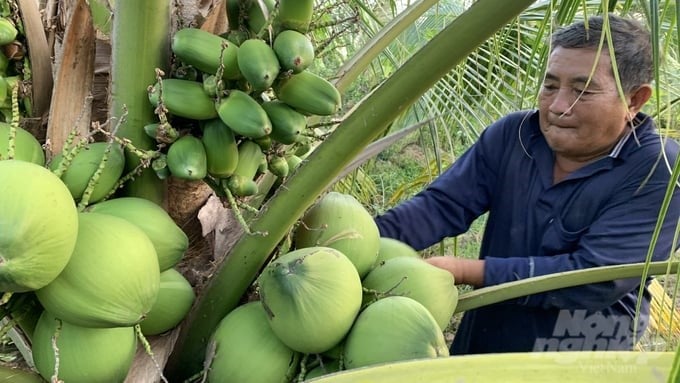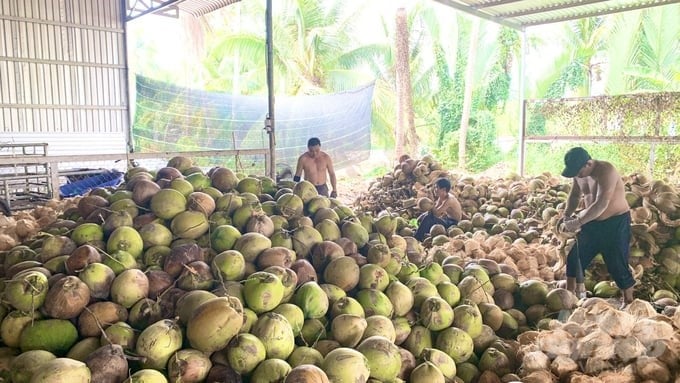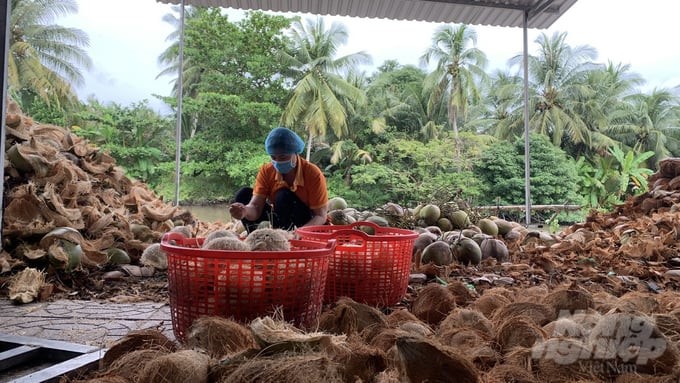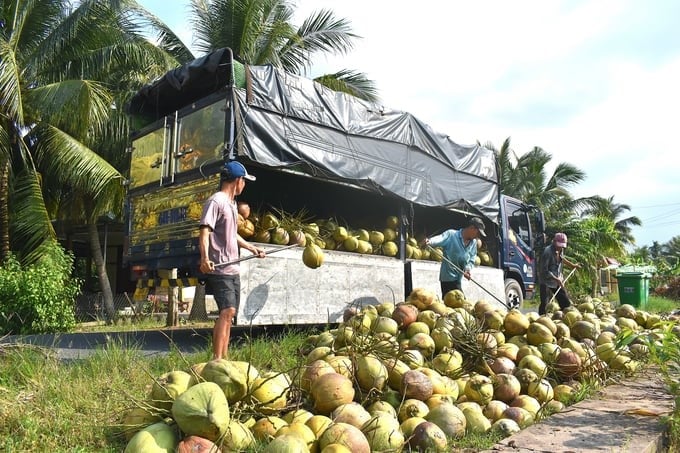May 20, 2025 | 11:03 GMT +7
May 20, 2025 | 11:03 GMT +7
Hotline: 0913.378.918
May 20, 2025 | 11:03 GMT +7
Hotline: 0913.378.918
Tra Vinh is the province with the second-largest coconut-growing area in the country, with an output of over 400 million fruits/year, but the product quality is generally not high.
According to Mr. Le Quoc Danh, Chairman of the People's Committee of Binh Phu commune, Cang Long district (Tra Vinh), most local farmers still maintain the habit of growing coconut according to traditional methods on a small, fragmented scale, lacking linkages. In recent times, the locality has been very persistent in mobilizing people to join cooperative groups and cooperatives and link up to build an organic coconut raw material chain.

Tra Vinh farmers have made many changes in coconut production towards organic, sustainable, and high-value. Photo: Ho Thao.
Accordingly, up to now, 372 households in Binh Phu commune have linked with Van Hung Agricultural Cooperative (Binh Phu commune) to grow 288 hectares of certified organic coconut according to European standards. Each year, this Cooperative supplies about 400 tons of coconut to the domestic market, links in production, and supplies products to a number of export companies.
Mr. Nguyen Huu Su, Director of Van Hung Agricultural Cooperative, said: To achieve organic certification according to European standards, coconut growers must cultivate according to a standard process. Farmers are not allowed to use chemical fertilizers or medicines, and they are not allowed to graze livestock and poultry in coconut gardens. Nutrient sources for coconut come from organic fertilizers and microbial fertilizers, and herbicides stored in the soil must be guaranteed to be 0%.
If farmers cultivate properly, the Cooperative buys coconut for farmers at a price of VND 5,000–10,000/dozen higher than the market price (1 dozen equals 12 fruits). Currently, Van Hung Agricultural Cooperative also insures the selling price of coconut for cooperative members at a minimum of VND 60,000/dozen; if higher, coconut will be purchased at market price.
In addition, thanks to the Cooperative's support of fertilizer in the amount of 2 bags/ha and training for farmers to use it properly, the majority of cooperative members said that farming results have been very positive in recent times.

Van Hung Agricultural Cooperative currently purchases organic coconut for farmers in Cang Long district at a price of VND 5,000–10,000/dozen higher than the market price. Photo: Ho Thao.
According to Mr. Nguyen Thanh, in Phu Hung 2 hamlet (Binh Phu commune), who is growing 2 hectares of green siamese coconut, the most important technique in organic coconut farming is spreading fertilizer properly. Farmers need to understand the biological characteristics of coconut trees, which have a root system concentrated at the foot within a radius of 1.5–2 meters, penetrating 4 meters deep into the soil. Based on this characteristic, growers should fertilize within a radius where many coconut roots are concentrated so that the tree can absorb fertilizer absolutely. Currently, Mr. The only has to water the coconut twice a month because he uses dry coconut leaves to cover the foot, so there is less water evaporation.
"Organic coconut growing must follow a very strict process, but it brings many benefits later. Most importantly, it does not affect the environment. At the same time, farmers do not need to have a 'headache' about output because the Cooperative will purchase at high prices. Furthermore, garden owners can save about 30% of input costs because they do not have to spend on chemical fertilizers and medicines," said Mr. The.
Mr. Le Van Ninh in Tan Hoa commune (Tieu Can district, Tra Vinh) said that when he first switched to growing organic coconut, he was skeptical about the productivity that would not be high without the use of chemical fertilizers but only organic fertilizers applied. However, after a while, he realized that, although it did not work as quickly as chemical fertilizers, the productivity of coconut produced according to organic standards was still equivalent and somewhat superior. The use of organic fertilizers contributes to making the soil loose, helping coconut trees withstand drought and salinity.
Mr. Ninh said: "When I used chemical fertilizers in the past, the coconut fruits fell completely, and for several months the coconut bunch would not bear any fruit. Since using organic fertilizer pellets, the coconut leaves are clearly green again. This season, the fruit set is about 30–50% higher than in normal months. The price of organic coconut is also VND 5,000–10,000/dozen higher than the price of regular coconuts, so the income is also better and more stable.

Workers at a business in Tra Vinh are carrying out the preliminary processing of organic coconuts into many different products. Photo: Ho Thao.
According to the majority of organic coconut farmers in the Mekong Delta, one of the benefits of organic farming is that coconut growers can produce their own organic fertilizer by taking advantage of local manure, such as pig, cow, and chicken manure. These fertilizers are composted with trichoderma mushrooms and mixed with by-products such as cocopeat, ash, rice husk, sawdust, etc. to improve the absorption ability of coconut roots.
Besides, growers also use parasitic bees to control pests such as beetles and black-headed caterpillars instead of using harmful chemical medicines. Thanks to the application of organic farming, the durability of coconut trees is increasing.
According to the Tra Vinh Department of Agriculture and Rural Development, although the selling price of coconuts in the Mekong Delta provinces sometimes fluctuates, one of the advantages of the organic farming method is that it changes farmers' farming thinking towards linkages and collective farming. At the same time, create a spread in the community about safe and responsible production.
Tra Vinh has nearly 90,000 coconut-growing households with more than 7 million trees on a total area of approximately 25,000 hectares, concentrated mainly in Cang Long, Tieu Can, and Chau Thanh districts. The province has 13 organic coconut raw material areas that have been built by four businesses with a total area of 4,012 hectares meeting EU and USDA standards, of which 260 hectares meet 6 standards (Europe - EU, US - USDA, Japan - JAS, Australia - ACO, Sweden - KRAV, and GlobalGAP).

Organic coconut is always sold at a higher price on the market, especially to meet increasing export demand. Photo: HT.
Mr. Le Van Dong, Deputy Director of the Tra Vinh Department of Agriculture and Rural Development, said that Tra Vinh province aims to develop 8,000 hectares of organic coconut by 2025, of which 6,000 hectares are certified organic. The province encourages and prioritizes businesses with strengths in deep processing technology and good consumption markets both domestically and for export to build processing factories and develop linkages with producers, establishments, and cooperatives to collect and pre-process coconuts in the province.
Along with that, the province supports people, cooperatives, and cooperative groups to newly plant or renovate existing coconut gardens; register and manage raw material areas according to VietGAP standards. At the same time, support businesses linking with households and establishments in registering for certification, evaluating, and managing raw material areas according to GlobalGAP and organic standards based on applying digital transformation to make information transparent in transactions and purchases.
Tra Vinh also has a policy to support coconut growers, according to Resolution No. 03 of the Provincial People's Council regulating policies to support restructuring of Tra Vinh province's agriculture for the 2021–2025 period. In addition to coconut trees, Tra Vinh also expands organic farming of rice and some other fruit trees to contribute to creating typical products for the province.
Mr. Nguyen Huu Su, Director of Van Hung Agricultural Cooperative, affirmed: "With the criteria of 'real making, real selling', we commit to purchasing 100% of the coconut output from farmers participating in the linkage. In the near future, we will continue to expand the organic coconut raw material area to 600 hectares and, at the same time, build a deep processing factory and find partners to export to the international market."
Translated by Thu Huyen

(VAN) Khanh Hoa is investing over 545 billion VND to develop 240 hectares of high-tech marine aquaculture in order to guarantee a consistent supply of seafood exports and achieve the USD 1 billion target.

(VAN) Minister of Agriculture and Environment Do Duc Duy held a meeting with Soopakij Chearavanont, Chairman of C.P. Group, on May 15.
/2025/05/16/3800-0-nongnghiep-143756.jpg)
(VAN) Suntory PepsiCo Vietnam coordinated with the Ministry of Education and Training to implement an education program on water conservation, reaching nearly 1 million primary school students nationwide.

(VAN) Vietnam’s TH Group officially put its high-tech fresh milk processing plant into operation in the Russian Federation, marking a historic moment as the first TH true MILK cartons were produced in Russia.

(VAN) Use of high-quality broodstock and biotechnology is regarded as the most effective approach to ensuring sustainable and economically viable shrimp aquaculture ahead of climate change and the emergence of increasingly intricate disease patterns.

(VAN) Carbon farming is a form of agricultural practices that helps absorb more greenhouse gases than it emits, through smart management of soil, crops, and livestock.

(VAN) This is a key content of the Memorandum of Understanding recently signed between the Vietnam Fisheries Society and Kunihiro Inc of Japan.